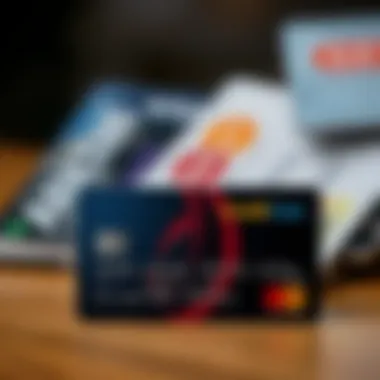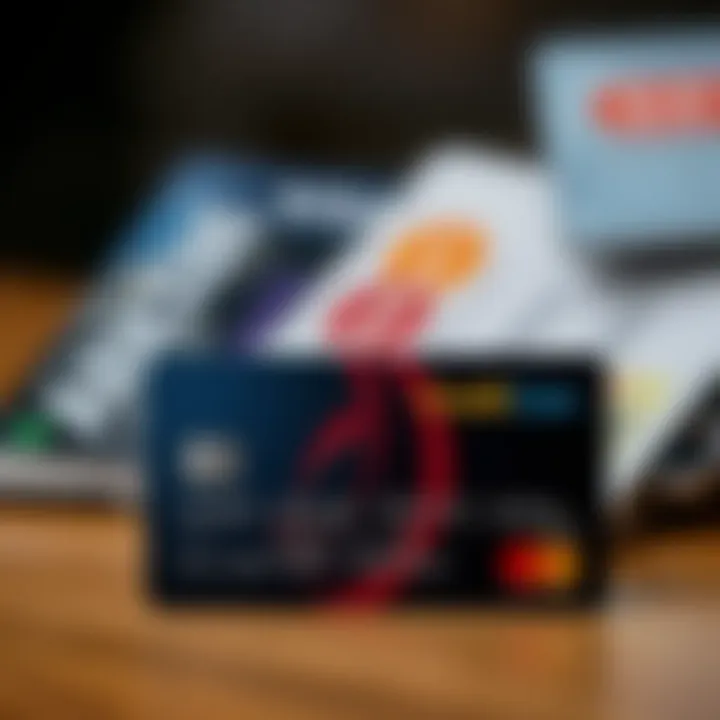Evaluating the Role of Credit Cards in Personal Finance


Intro
In today's financial landscape, understanding the necessity of credit cards can feel like navigating a labyrinth. For many, credit cards are a staple, providing financial flexibility, while for some, they might be seen as a slippery slope to debt. This piece aims to unpack the role credit cards play in managing personal finances, shifting through the benefits and drawbacks, while presenting alternatives that might better suit your individual needs.
The importance of assessing credit cards lies in their impact on financial health. They can help cultivate a positive credit score, facilitate larger purchases, and offer rewards. Yet, the risk of falling into debt can't be brushed aside. Determining whether to wield this financial tool means understanding its core functions, its advantages, its potential pitfalls, and the various options available in the market today. This article intends to equip young professionals, families, and students with the knowledge necessary to make informed decisions regarding the use of credit cards, steering you away from common traps and towards a more stable financial future.
Preamble
In today’s fast-paced world, managing personal finances has taken on a new importance. Credit cards have become a staple in this landscape, offering convenience and a sense of security. However, their necessity can vary significantly depending on individual circumstances. This article dives deep into the fundamental question: Are credit cards essential or just another financial tool?
Understanding the role credit cards play is pivotal. For young professionals starting out, they can help lay the groundwork for a solid credit history. Families may use them for larger purchases or unexpected expenses, acting as a buffer in emergencies. Meanwhile, students navigating their financial journey might face a different set of challenges and considerations.
The landscape of credit cards is multifaceted, encompassing both benefits and drawbacks. Utilising them might offer perks like rewards or consumer protection, but such advantages come with potential pitfalls, such as debt accumulation and high interest rates. It's crucial to weigh these aspects carefully.
As we explore credit cards in detail, from how they function to their impact on personal finance, the goal is to provide clarity. Understanding when a credit card is truly needed can empower individuals to make informed decisions that align with their financial goals.
Ultimately, this article aims to demystify the world of credit cards and encourage thoughtful consideration of one's financial needs. By the end, you'll have a clearer picture of whether a credit card belongs in your wallet—or if alternative methods are more suitable for your situation.
Understanding Credit Cards
When diving into the landscape of personal finance, understanding credit cards is crucial. These financial tools, while sometimes viewed with skepticism, can offer numerous benefits when used responsibly. This section will explore what credit cards are and how they function, laying the groundwork for a thorough evaluation of their necessity in today’s financial world.
What is a Credit Card?
At its core, a credit card is a type of payment card that allows the cardholder to borrow funds from a pre-approved credit limit to make purchases or withdraw cash. Unlike a debit card, which draws money directly from a bank account, a credit card operates on borrowed money. This means that timely repayment is essential to avoid unnecessary interest fees.
Credit cards are often issued by financial institutions, and they come with various terms, fees, and rewards structures. For many people, credit cards are part and parcel of daily life, serving as a convenient way to handle purchases, from groceries to flights, without the immediate need for cash. Beyond convenience, credit cards often come packed with perks such as cashback rewards, travel insurance, and purchase protections. However, understanding the fine print of these offerings is just as important as recognizing their potential pitfalls.
How Credit Cards Work
Understanding the mechanics behind credit cards is fundamental for anyone looking to manage their finances wisely. When a cardholder uses their credit card to make a purchase, they are borrowing money from the credit card issuer up to their credit limit. Here’s a simple breakdown of the process:
- Making a Purchase: When you use your credit card, the card issuer pays the merchant on your behalf. You essentially owe that amount to the card issuer.
- Billing Cycle: Credit cards operate on a monthly billing cycle. At the end of each cycle, the cardholder receives a statement detailing all purchases, the total debt owed, and the minimum payment requirement.
- Interest Rates: If the full balance isn’t paid by the due date, interest charges apply, typically at an Annual Percentage Rate (APR) that can vary significantly between cards. So, if you're consistently carrying a balance, you're likely to see those charges climb over time.
- Grace Period: Most credit cards offer a grace period—a short time when no interest accrues on new purchases if the previous month's balance is paid in full. This is a crucial period for avoiding interest.
Understanding these elements helps in navigating the sometimes murky waters of credit.
In essence, managing a credit card responsibly can build a solid credit history, benefiting one's future financial endeavors.
With a clearer picture of what credit cards are and how they function, individuals can analyze their own financial behaviors and needs. Whether monitoring spending habits, assessing repayment capability, or evaluating potential rewards, knowing these fundamentals serves as a springboard into the deeper nuances of credit card usage.
The Role of Credit Cards in Personal Finance
In an age where managing personal finances effectively is crucial, the role of credit cards stands out prominently. Credit cards have evolved from mere transactional tools to essential instruments that can help shape financial stability and growth. Their influence is far-reaching; we see it in the way individuals approach large purchases, emergencies, and even their long-term financial goals. A well-rounded understanding of the role credit cards play can provide insight into their necessity or lack thereof in one’s financial journey.
Building Credit History
When you first dip your toes into the world of finance, establishing a solid credit history is vital. A credit card is akin to a key that opens the door to various financial opportunities. Essentially, having a credit card allows you to build your credit score, which lenders scrutinize when you apply for loans or mortgages down the line. On-time payments are reported to credit bureaus, creating a trail that shows your payment habits and creditworthiness.
Recommendations abound, but it’s important to exercise caution. Some young professionals might think that maxing out their credit limit and paying it off at the last moment will boost their scores. In reality, it’s more about maintaining a low credit utilization ratio—ideally below 30%—that helps you stay in good standing. This proactive measure not only aids in getting better rates on loans but may also influence potential landlords or employers checking your financial background.
Facilitating Purchases
Credit cards act as facilitators for purchases, particularly in scenarios where immediate cash isn't on hand. Imagine needing to pay for unexpected car repairs or replacing a broken appliance; having a credit card lets you manage these expenses without derailing your weekly budget.


Utilizing a credit card for purchases can also come with additional perks. Many cards now offer rewards programs, allowing users to earn points or cashback on everyday spending, from groceries to gas. However, using these benefits wisely is key. It can be tempting to overspend in order to accumulate rewards, but this can lead to accruing debt that spirals out of control. Therefore, it’s essential to strike a balance between leveraging card features and maintaining fiscal responsibility.
"With great power comes great responsibilty". This saying rings true, especially in the context of how credit cards can affect your financial well-being.
Emergencies and Flexibility
A credit card can also serve as a safety net during emergencies, providing access to funds when unexpected expenses arise. Life is unpredictable, and having that financial cushion can offer significant peace of mind. For instance, if a sudden medical issue crops up or an unforeseen travel has to be made, credit cards extend flexibility that might not be available through cash or debit card transactions.
Moreover, the ability to defer payments gives you some breathing room. While you do want to pay your balance off regularly to avoid high-interest fees, having that option can safeguard your primary savings and keep you afloat during tough times. However, one must tread carefully; failing to manage credit card debt can result in more chaos than comfort. The key lies in understanding the trade-offs of using credit as a buffer against financial strains.
Advantages of Having a Credit Card
Credit cards often stir a mix of enthusiasm and caution among users. In today’s financial landscape, understanding their advantages is essential. For many, credit cards can serve as a powerful financial tool. They offer various perks and conveniences that align with modern-day purchasing habits and financial objectives. Whether you’re a young professional starting out or a family managing expenses, knowing the benefits is vital.
Rewards Programs and Benefits
One of the most enticing features of credit cards is the rewards programs they offer. Many credit cards are designed with incentives in mind, aiming to reward users for their spending habits. This can range from cash back on groceries to points that can be redeemed for travel. For instance, a card like the Chase Sapphire Preferred provides travel rewards in addition to points for dining. The allure lies in how these benefits translate into tangible savings or experiences over time.
Moreover, a rewards program isn’t a one-size-fits-all scenario. Each card comes with different structures that might suit unique spending habits. This could mean every dollar spent earns points, or other cards offer specialized categories where users can earn extra. The diversification of rewards means one can align their choice with their personal habits, thus maximizing value.
- Cashback rewards: Ideal for everyday purchases.
- Travel points: Excellent for frequent travelers who desire perks such as free flights.
- Shopping discounts: Some cards provide discounts when shopping with specific retailers.
Consumer Protections
Navigating financial transactions won't always be smooth sailing. This is where consumer protections associated with credit cards come into play. Many credit cards come with essential safeguards against fraud. If unauthorized transactions occur, most credit card companies offer zero liability policies, which can protect your funds and provide peace of mind for users worried about identity theft. This feature is particularly useful when considering an increase in online transactions.
In addition, credit cards can safeguard consumers through return protection and extended warranties on purchased products. For instance, if a product fails shortly after purchase, the card may offer coverage that allows for refunds or replacements that wouldn't always be available if paid in cash.
Drawbacks of Credit Card Use
When it comes to personal finance, credit cards stir up quite the debate. While they can offer convenience and benefits, there are serious drawbacks that cannot be brushed aside. Assessing these drawbacks is critical for anyone looking to navigate the financial waters competently. Understanding the complications associated with credit cards can prepare users to make informed decisions and avoid pitfalls.
Debt Accumulation
One of the most glaring issues with credit card usage is the propensity for debt accumulation. It's easy to fall into the trap of swiping a card without thinking twice about the consequences. Most young professionals, students, and even families find themselves lured by the instant gratification a credit card provides. It's like being handed a golden ticket, allowing for immediate purchases without the necessity of hard cash. However, this often leads to a perilous cycle of spending more than one can afford.
For instance, a young professional may receive an unexpected bonus, which leads to a celebratory dinner out on the town, followed by an impulsive shopping spree. Months later, they might be facing a seemingly insurmountable balance, struggling to make minimum payments just to keep the creditors at bay. This situation isn't uncommon—many find their credit limits creeping upward as their spending habits spiral out of control, leading to significant financial stress and anxiety. The direct consequence? Over time, mounting debt can damage not only financial well-being but also emotional health.
Interest Rates and Fees
Another vital element to consider is the interest rates and fees associated with credit card use. Not all credit cards are created equal. While some may offer enticing rewards programs, they can also have steep interest rates, making it easy to be buried under a mountain of debt. If payments are missed or even late, the hit can be heavy.
Here’s how it typically works: one promotional offer may boast a low or even 0% interest rate for a limited time. Sounds great, right? But once that period ends, the rate can skyrocket, sometimes hitting 20% or beyond. This turns what seemed like a manageable expense into a financial nightmare. Additionally, hidden fees from annual charges, late payment penalties, and foreign transaction fees can add to the financial strain.
To illustrate: consider a family who travels internationally and uses a credit card that charges 3% for foreign transactions. If they are not vigilant, those transaction fees can significantly increase the overall cost of their vacation. Ultimately, being blind to these terms can trap users into a cycle of paying off credit card debt rather than spending on necessities or savings.
"Being unaware of credit card terms is like entering a maze blindfolded—a way out exists, but the journey could be treacherous."
Impact on Credit Score
Finally, the impact on credit score cannot be underestimated. In the world of finance, your credit score is a prominent player that can affect everything from loan approvals to interest rates on mortgages. Each time you apply for a new credit card, it triggers a hard inquiry, which can temporarily lower your score. Even if responsibly managed, having a high credit utilization ratio—the amount of credit being used relative to the total available credit—can signal to lenders that a consumer may be overstretched.
For example, let’s say you hold multiple credit cards and max out half of your available credit. Your credit score could suffer significantly, reducing your chances of securing a future loan for crucial purchases, like a home. what's more, many individuals are not aware of how these spending habits impact their larger financial picture. As a result, a mismanaged credit score can lead to long-term financial consequences that echo through various aspects of life.
Alternatives to Credit Cards


In today’s world, understanding financial tools is crucial. Though credit cards are prominent, it’s valuable to explore alternatives that suit various lifestyles and needs. Alternatives to credit cards can provide a safer, simpler way to manage finances, allowing individuals to access funds or make purchases without the pitfalls sometimes associated with credit card use. Each alternative has its own strengths, weaknesses, and unique features. This section unpacks these options to offer a variety of choices that can enhance financial well-being.
Debit Cards
Debit cards are often regarded as a reliable alternative to credit cards, providing users with a way to access their bank funds directly. Each purchase made with a debit card pulls from a user’s existing checking account balance, thereby circumventing debt accumulation often tied to credit cards.
Some benefits of debit cards include:
- Budget Management: Since spending is limited to available funds, it is easy for users to track and manage their expenses. There’s no risk of overdrawing without adequate balance unless overdraft protection is enabled.
- No Interest Charges: This characteristic proves significant for individuals aiming to steer clear of interest rates that can sneak up when balances are carried over month after month.
- Widely Accepted: Debit cards are accepted nearly everywhere credit cards are, making them a convenient option for most purchases.
Nonetheless, it’s essential to be cautious. The lack of credit-building potential is a downside for some individuals focused on improving their credit score. Additionally, depending on the bank, some debit cards may lack consumer protections offered by credit cards.
Prepaid Cards
Prepaid cards serve as a blend between cash and credit cards. Users load funds onto the card and can spend up to that amount. One significant advantage is that it eliminates any risk of overspending or accruing debt since funds must be preloaded.
Advantages include:
- Control Over Spending: Setting a budget becomes easier when funds must be deposited upfront. This can help families, students, or young professionals who struggle with impulse purchases.
- Convenience for Gifting: Prepaid cards are frequently used as gifts since they allow the receiver the freedom to choose their purchase, while budget limitations remain in place.
- Simplified Use: Because they do not require a bank account, prepaid cards appeal to individuals who may not have traditional banking access.
However, it's essential to be aware of potential fees associated with loading funds, monthly maintenance fees, or transaction fees that can add up.
Cash Payments
Finally, cash remains an enduring alternative. Using physical cash can stimulate better spending habits since it involves physically handing over funds. This tangible method can benefit individuals by directly tying spending to their available cash.
Benefits of cash payments cover various aspects, including:
- No Fees or Interest: Cash transactions involve no hidden fees, interest rates, or complications. You pay, and that’s it.
- Increased Awareness: Handling cash can give a clearer picture of how much money is available. Withdrawn bills generally feel more
When is a Credit Card Necessary?
The necessity of credit cards often varies depending on individual circumstances and financial goals. It can be a mixed bag of advantages and challenges, leaving many to wonder when exactly having one is more a blessing than a burden. This section aims to distill the core elements regarding when credit cards are a prudent financial instrument rather than a potential pitfall.
For Young Professionals
Young professionals stepping into the world of finance often face a steep learning curve. This is a time when establishing a solid credit history is paramount. Having a credit card can serve as a crucial stepping stone in this journey, as timely payments contribute positively to a credit score. This score not only influences loan approvals but can also affect leasing agreements for apartments and even job opportunities in certain fields.
Beyond credit scores, young professionals typically have limited cash flow. A credit card can provide a safety net in unforeseen circumstances, like a sudden car repair or unexpected medical bills. Yet, it’s essential to tread lightly. Racking up a balance that's hard to pay off can quickly spiral into debt, which is why a careful balance of spending and repayment is needed.
Benefits of credit cards for young professionals include:
- Building credit history for future major purchases
- Flexibility in managing cash outflows
- The potential for cashback or rewards on purchases
For Frequent Travelers
For those who frequently jet-set for business or pleasure, credit cards often become indispensable tools. Many travel credit cards offer perks that can vastly enhance the overall travel experience. From travel insurance to airport lounge access, these benefits can lighten the load of the often hefty costs associated with traveling.
"When the best deals come with credit card benefits, strategic spending pays off."
Moreover, international travel typically necessitates the use of credit cards, as they can offer better currency conversion rates compared to cash exchanges or debit cards. However, it’s important to watch out for those foreign transaction fees that might chip away at savings. Opting for a card without those fees is advisable for the globetrotters among us.
Essential reasons why credit cards are necessary for travelers include:


- Enhanced safety by reducing the need to carry large amounts of cash
- Earning mileage points, which can lead to free flights or upgrades
- Accessing purchase protections and travel insurances
For Building Financial Identity
Establishing a financial identity is no small feat, and credit cards can play a pivotal role in this process. For individuals new to the credit scene, such as students or those starting anew after financial difficulties, securing a credit card can aid in laying a foundation for future financial endeavors. This might include things like buying a car, securing a mortgage, or even renting an apartment.
Credit cards allow individuals to demonstrate their responsible handling of finances through regular, on-time payments. This behavior is closely watched by credit reporting agencies and significantly impacts one's credit profile.
Considerations for using credit cards to build financial identity are:
- Establishing and maintaining a good credit score
- Learning responsible financial practices through regular usage and payments
- Gaining access to loans and services due to improved creditworthiness
Evaluating Your Needs
When considering whether to use credit cards, evaluating your personal needs becomes paramount. This process isn’t just a box-checking exercise; it's a thoughtful inspection of your financial landscape and lifestyle choices. The right card can open numerous doors—or it can dim your financial future. By assessing your individual circumstance, you empower yourself to make wiser financial decisions.
Assessing Financial Goals
Your financial goals are the North Star in this evaluation process. Whether you’re saving for a down payment on a house, planning for retirement, or simply trying to build a nest egg, your goals require a tailored approach. A credit card can either finesse your journey towards these milestones or hinder it altogether.
- Short-term Goals: If you're working towards something imminent, like a vacation or an emergency fund, certain credit cards with no annual fees or attractive cashback rewards might help avoid splurging all your savings at once.
- Long-term Goals: For more substantial plans, like investing in education or property, a credit card that offers benefits like travel rewards or low intro APR might provide both immediate liquidity and long-term advantages.
The key here is introspection. Ask yourself: How does having—or not having—a credit card align wit my financial journey?
Understanding Spending Habits
Next on the agenda is a deep dive into your spending habits. Everyone has their quirks when it comes to money: some folks are savers, others, not so much. Analyzing how you spend can help identify whether a credit card aligns with your financial behavior.
- Impulse Spending: If you often find yourself buying on a whim, a credit card could be a double-edged sword. It might provide you with rewards or cash back, but it could equally lead to debt traps.
- Budget-Conscious: For disciplined spenders, a credit card is an excellent way to enjoy rewards and perks without losing track of finances. Establishing a straight-as-an-arrow budget could make a credit card work in your favor.
By recognizing your strengths and shortcomings, you can figure out if the convenience and potential benefits of a credit card outweigh the pitfalls.
Weighing Risk and Reward
Finally, weighing the risks and rewards associated with credit cards is crucial. Many individuals simply view credit cards through the lens of potential benefits, neglecting the inherent risks. It's essential to have a balanced perspective.
Benefits
- Rewards Programs: Many cards offer points or cash back that can be converted into experiences or tangible benefits.
- Credit Building: Proper usage can enhance your credit score, paving the way for future loans or better interest rates.
Risks
- Interest Rates: If balances are not paid off, interest can accumulate quickly, snowballing into high debt.
- Credit Score Impact: Late payments or high credit utilization can drastically affect your credit rating.
In summary, understanding and evaluating your needs concerning credit cards is a comprehensive process that involves aligning your financial goals, scrutinizing your spending habits, and assessing the potential risks versus the rewards. This evaluation can be the key to a financially stable future.
End
In the grand scheme of personal finance, understanding the necessity of credit cards is not just a casual topic; it’s a crucial element that can impact a person's financial future significantly. As we wrap up this discussion, it’s essential to reflect on a few key insights.
First, utilizing credit cards can serve as a double-edged sword. While they offer the convenience of making purchases and can aid in building a solid credit history, they come with the inherent risk of accumulating debt if not managed wisely. Young professionals and families, especially, need to tread carefully when weighing the pros and cons of this financial tool.
"Knowing the ins and outs of credit cards can make the difference between financial disaster and a strong financial future."
Next, we discussed how understanding one's spending habits is fundamental in assessing whether a credit card is necessary. Individuals who find themselves often exceeding their budgets might want to reconsider their reliance on credit cards. Conversely, if you frequently travel or partake in lifestyle choices that benefit from rewards programs, a credit card could be advantageous.
Another critical consideration is how credit cards affect one’s financial identity. For students and first-time cardholders, the initial introduction can be overwhelming, but if approached with maturity and knowledge, it can bolster financial independence.
In summarizing, the conclusion circles back to synthesizing all the information presented throughout—finding the right balance between the ease of credit card use and staying financially responsible is paramount. The bottom line is this: before committing to a credit card, one must thoroughly assess their financial goals, understand their spending habits, and carefully weigh potential risks against the rewards. This holistic approach will guide individuals toward making informed decisions that align with their long-term financial aspirations.
Ultimately, the necessity of credit cards hinges on personal circumstances and financial literacy, making it a highly individualized assessment. Depending on where you stand in your financial journey, having a credit card might be not just a benefit but a necessity.



